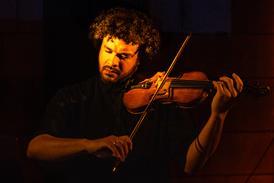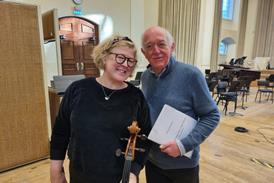To tie in with our review of her latest CD, the violinist shares her insights

1. Listen to the way you play, not the way you think you play
I feel like a relationship counsellor when I say this, but a lot of people are not used to really listening. It’s a muscle skill, and you can learn it.
My first tip would be to take the physicality and the technical difficulties out of what you’re doing because if you have to navigate a big shift or a long difficult passage, your mind and your body know it’s difficult and that can distract you from listening to what you actually sound like.
Slow practice helps, not only because it slows down your motor skills, but because it enables you to hear in slow motion. Then, when you’ve got something sounding the way you want it, you can speed it up with the same listening skills.
2. Don’t just focus on your weaknesses
We all have areas where we can improve but there are certain things I know I will never be at my best doing, for example, up bow staccato. I don’t have a good one. There are other things that I’m better at, and one of the ways you can improve is by recognising your strengths and focusing on those, because they are what makes you stand out as a performer.
3. Play the music you love
Whenever I do this, then technical difficulties become less of an obstacle. Take Stravinsky’s Violin Concerto. There are parts that are extremely difficult, but the music of those passages is so brilliant that the technical issues don’t bother me in the same way that they would in a piece with no substance that’s all about passagework and circus monkey technique.
The reason for that is that I grew up a prodigy and had to play those sorts of pieces all the time, so I now have an instant aversion to them. It helps to know what sort of repertoire you love, but if you don’t that’s ok too. My suggestion would be to explore, to listen to different kinds of music and to ask yourself why you feel the way you do about them.
4. Don’t suffer for the sake of suffering
There are certain things that come more naturally to different players, and you need to be able to make that call on when to stop forcing yourself to do something that doesn’t feel natural and replace it with something that is a better fit for you - be that a fingering or a bowing or something else. That’s what makes a great player: having the sense of judgement to make that decision. It’s not about giving up, it’s about intelligently thinking through the different solutions to a problem.
5. Identify the problem
If you’re going to fix anything, you have to first ask yourself what is going wrong, and why, because if you don’t know, then how will you ever fix it? That may sound simplistic, but once you’re encountering difficulties, it’s not always so easy to remember.
Read our review of Leila Josefowicz’s CD.



































No comments yet